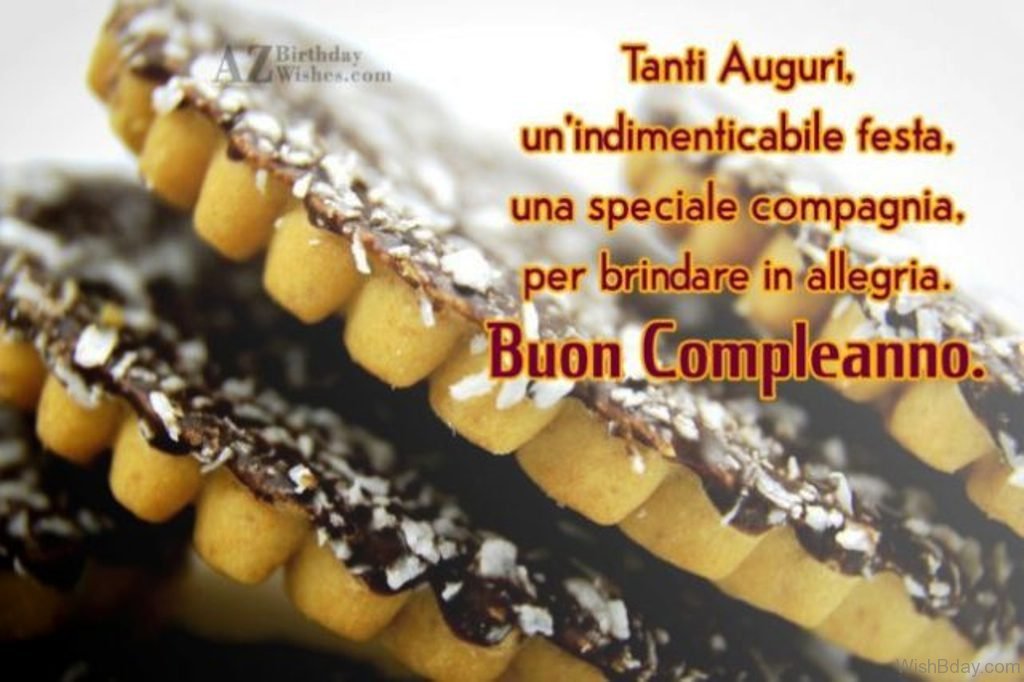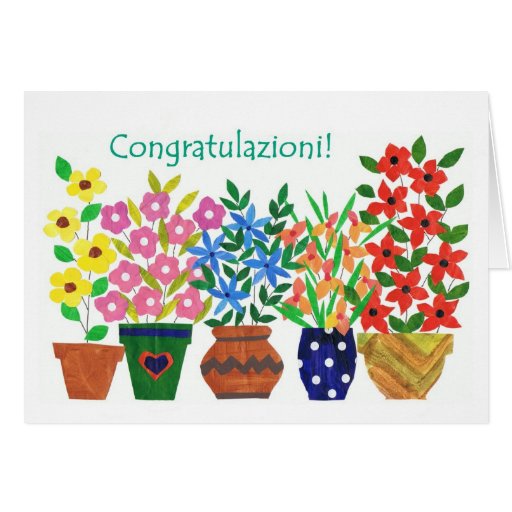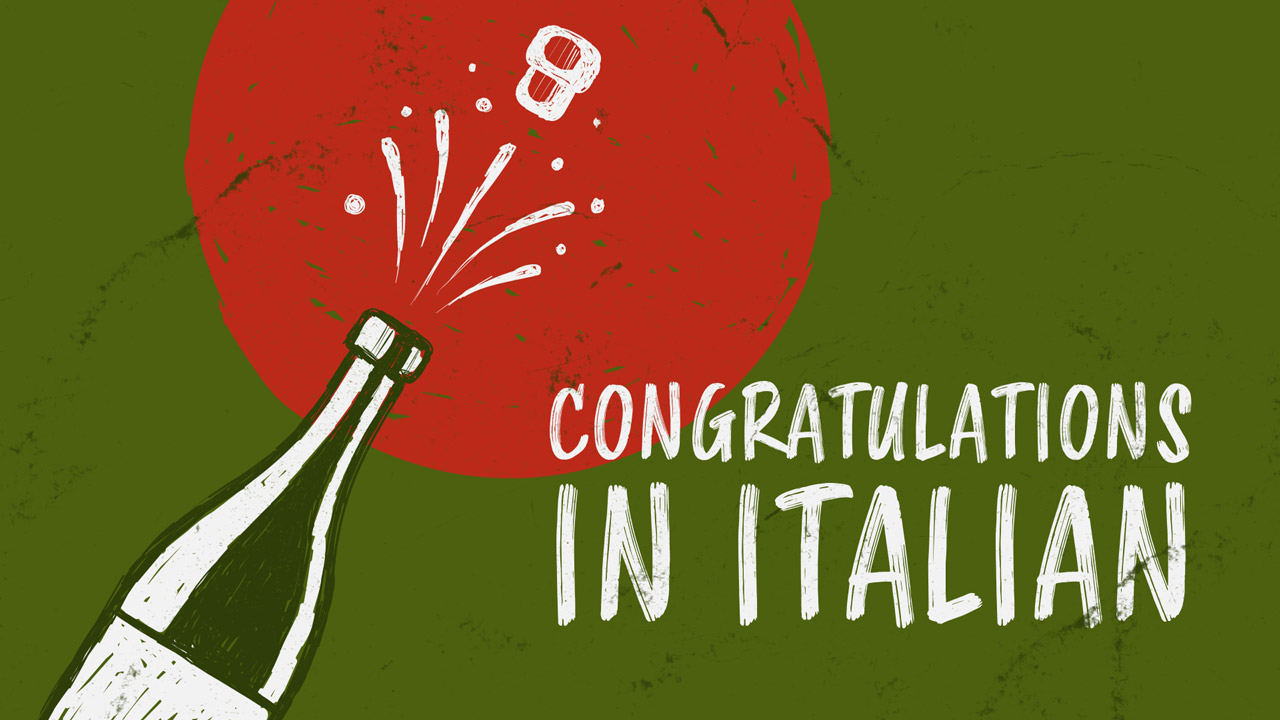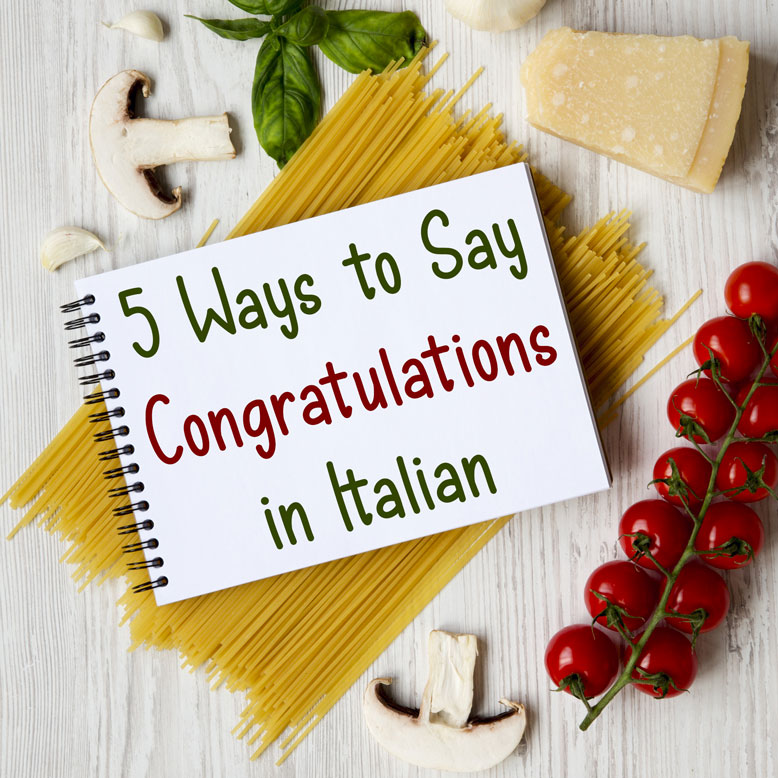
20 Italian Birthday Wishes
Two Main Takeaways. A common structure to give a compliment in Italian is: "come" followed by a verb. For example: "come sei bravo". One of the most common Italian words for congratulating someone is: "auguri", in English "best wishes".

5 Ways to Say "Congratulations!" in Italian Daily Italian Words
2. Use Body Language. In Italian culture, body language is as important as the words you use. When congratulating someone, it is common to accompany your words with a warm smile, a handshake, or even a hug, depending on your relationship with the person. 3. Learn Regional Variations (If Necessary) Italian is a language rich in regional variations.

Italian 'Flower Power' Congratulations Card Zazzle
Learn Italian with Memrise. Learn how to say congratulations! in Italian, how to say it in real life and how you can use Memrise to learn other real Italian phrases.

Congratulazioni Means Congratulations in Italian Hand Drawn Modern Lettering Stock Vector
If you are looking for a way to congratulate someone (such as a friend, family member, or colleague) on an important life event or achievement, look no further: here you will find five ways to express "Congratulations!" May translate. In Italian! 1. Congratulations! Let's start with the expression closest to the English equivalent. Congratulations It […]

Happy Birthday Songs in Italian, Congratulations in Italian. (Italian Version) YouTube
While it isn't a direct translation for "congratulations," it is still a wonderful way to recognize and celebrate happy events in other people's lives. Here are some examples using this phrase: 2. Tanti auguri a te! (Happy birthday to you!) 3. Auguri di buone feste! (Happy holidays!) 4.

"Congratulations" in Italian (and 20+ more Italian Celebration Phrases)
2. CONGRATULATIONS (IN ITALIAN). Let's move on to the congratulations. In Italian, you say "CONGRATULAZIONI" and these are some instances where you can use this word: a promotion or a new job, graduation, a wedding or an engagement, a new birth. Let's see how to use this word in a context. You need the preposition "per" to refer to the reason you're congratulating someone, for.

Auguri Means Best Wishes, Congratulations in Italian Hand Drawn Modern Lettering Stock Vector
Italy, known for its rich culture and vibrant language, is a country where celebrating achievements and offering congratulations are cherished traditions.. The most common way to express congratulations in Italian is by using the word "Congratulazioni" (con-gra-tu-la-tzi-o-nee). This is a simple and straightforward term that can be used.

Come CONGRATULARSI in ITALIANO Learn How to Offer Your Congratulations in Italian! YouTube
The most literal way to say "congratulations" in Italian is congratulazioni. With it, you get phrases such as le mie congratulazioni ("my congratulations") or even le mie più sincere congratulazioni ("my most sincere congratulations"). As you'll notice, "congratulations" and congratulazioni look very similar.

Tanti Auguri Brush Paint Hand Drawn Lettering On Black Background Congratulation In Italian
Congratulations in Italian can be expressed in many ways, from the simple "bravo" to the formal "congratulazioni." Knowing the right words will make weddings, birthdays, engagements and graduations so much sweeter. Learn them all in this guide to Italian congratulatory phrases, which includes audio and cultural notes!

Congratulations in Different Languages Word Cloud Stock Illustration Illustration of
Congratulazioni! Congratulazioni is the most literal translation of "congratulations" in Italian. With it, you get sentences such as le mie congratulazioni ("my congratulations") or le mie più sincere congratulazioni ("my most sincere congratulations"). Congratulazioni is viewed more as a formal expression to convey congratulations.

Tanti Auguri Brush Paint Hand Drawn Lettering On Black Background With Splashes Congratulation
Full Playlist: https://www.youtube.com/playlist?list=PLLALQuK1NDriWVCn_cjyQ6-XaYOkyBOg7--Like these Italian Lessons !!! Check out the official app http://app.

How to Say "Congratulations" in Italian Italian Lessons YouTube
The root word is felicità, which means "happiness.". Here are some examples: Italian: Felicitazioni e ti auguro un pieno successo per l'avvenire. English: Congratulations, and wishing you plenty of success in the future. Italian: Felicitazioni, signore e signora Ricci. English: Congratulations Mr. and Mrs. Ricci.

Auguri Meaning Congratulations in Italian Handwritten Lettering Vector Illustration Stock Vector
Tanti auguri! = lit: Many best wishes! Auguroni! = lit: Big best wishes! 3. Complimenti! Of all the expressions listed here, Complimenti! is probably the closest in nature to Congratulations! in terms of its versatility and formality. It is a masculine noun ( complimento, meaning compliment) but, in this context, it is always used in its plural.

Congratulazioni Means Congratulations Italian Hand Drawn Stock Vector (Royalty Free) 1844066863
1. If you want to congratulate someone for their successes or for having done a very good job, you can use simple expressions such as: BRAVISSIMO/A! (That's great!) CHE BRAVO/A! ( That's good!) OTTIMO LAVORO! ( Great job!) Maybe, if you want to encourage them for the future, you can add other expressions such as:

Auguri Agli Sposi Means Congratulations To the Newlyweds, Wedding Wishes in Italian Stock Vector
Ti faccio i miei migliori auguri! You deserve all the best in your endeavors, and so I give you my heartfelt wishes. 'Ti faccio i miei migliori auguri!' is a lovely way to say congratulations in Italian. This phrase is used to express sincere well-wishes and convey a sense of encouragement and support.

5 ways to say "Congratulations!" in Italian Story Telling Co
Congratulazioni! (Congratulations!) This word is used during a personal non-recurring celebration (wedding, the birth of a baby, etc.) addressing only those who are directly involved. Watch out! Keep well in mind that if the personal non-recurring celebration hasn't occurred yet, we'll use " auguri " and not " congratulazioni! ".